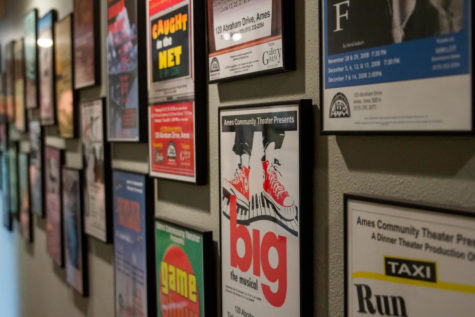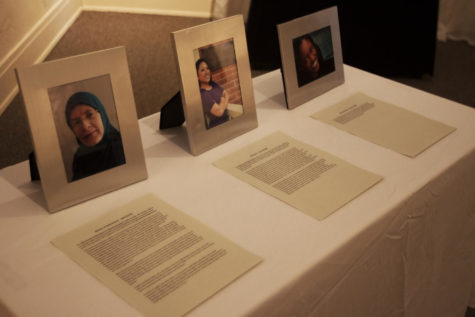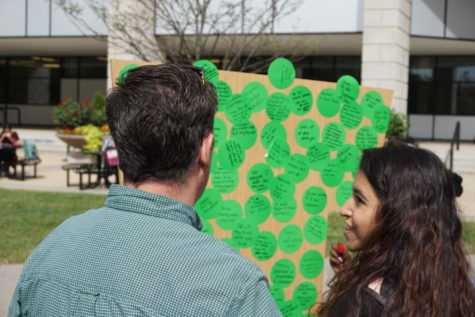From player to assistant coach: Schaben’s journey alongside Fennelly
October 19, 2015
ISU women’s basketball coach Bill Fennelly sat in his office on a normal weekday, doing his normal routine when he got a text from assistant coach Latoja Schaben.
Fennelly looked at his phone for a minute. The words took him back a little. He smiled but also had tears in his eyes.
It read: “Hey Coach, I really appreciate what you’ve done for me.”
Schaben — formerly Harris — started as young girl in Mansfield, Ohio. Her mom noticed how hyperactive she was and told Schaben that she should get involved with basketball. There wasn’t a girl’s team, so she played on the boy’s basketball team until seventh or eighth grade.
“When I first started, I had no confidence, no self-esteem whatsoever,” Schaben said. “[My mom] promised me in a game we played that every point you get, you get a dollar. I gained confidence from that, and I think I made $12 that day.”
That’s what made Schaben want to start playing basketball. She said that’s how she began to excel. Her mom stopped giving Schaben money after her $12 game because she continued to score more and more.
In high school, Schaben became a standout post player. Colleges noticed her athletic ability and started recruiting her.
At that time, Fennelly was the head coach at Toledo. He knew Schaben was teetering between Toledo and a junior college, so he drove to Mansfield to pitch her what Toledo had to offer.
“Would you rather play at a two-year school or three years?” Fennelly asked Schaben. She pondered it and something finally clicked.
“It was that important that I played for him that he came down and saw me again,” Schaben said. “I felt like he, not only cared about basketball, but he cared for me.”
Shortly after, Schaben made an official visit to Toledo. At that time, NCAA rules allowed high school coaches to take student-athletes on recruiting visits, and college coaches could drive them back home.
The car was silent. After a brief period of awkward silence, Fennelly turned on the radio. He began to whistle along to every song. Schaben sat there in silence. Fennelly whistled along for the rest of the hour-and-a-half long drive back to Mansfield.
“I was like, ‘Man, this is a smart guy,’” Schaben said. “I didn’t say two words, so when Coach Fennelly first, initially met me he thought I was the shyest person ever. Little did he know…”
During a high school all-star game at Ohio State, Schaben looked over and saw Fennelly watching her. After Schaben dominated on the court, Fennelly handed her a letter of intent to Toledo — something also allowed at that time.
“Back then, I thought it was the biggest thing because that meant he actually cared for me and he wanted me to play for him,” Schaben said.
Her grades were not exactly where they needed to be, Schaben said, so Fennelly made the offer with faith that Schaben would improve her grades.
Schaben committed to Toledo, marking the start of a lasting relationship with Fennelly.
One night during her freshman year at Toledo, Schaben felt all the stresses of life started piling up — basketball, school, being away from home. She was taking it pretty hard.
The clock struck 2 a.m. Schaben picked up the phone and called Fennelly. She was bawling.
“I don’t know if I can do this,” Schaben told Fennelly.
Fennelly drove over to Schaben’s residence hall.
“For him, as a head coach, to come over to my dorm at 2 a.m. and talk to me for an hour, it meant that he not only cared for me as a player, but as a person too,” Schaben said. “He was like a dad away from home. It wasn’t just about basketball with him.”
Fennelly described Schaben as a kid whose family members hadn’t attended college, and she had to work hard in school.
“There were some challenges in her life, but she really appreciated people who cared about her,” Fennelly said.”
Some of the things Fennelly told Schaben that night have stuck with her for decades, she said. He told her to just relax and everything would work out, advice she also applied to her game on the court.
She was a powerful, physical, inside presence. Schaben backed opponents down, attacked the goal, rebounded and ran the court. Fennelly said there was not one bit of finesse in her game. She was always go, go, go, and sometimes she needed to relax.
“The more you hit [Schaben] and the more contact, the better,” Fennelly said. “I think the more you competed and challenged her, the better she got. Her game was better against the better people that we played against.”
Schaben rose to the challenge and became Fennelly’s best player at Toledo. She led the Rockets to the second round of the NCAA Tournament in 1991-1992 and finished her career with 1,466 points, which is eighth all-time at Toledo, and with 833 rebounds, which is sixth all-time at Toledo. Schaben also holds the school and Mid-American conference record for career field goal percentage at .623, and ranks second in blocked shots with 70 and rebounding average with 9.2 boards per game.
After her dominating career at Toledo, Schaben took her talents overseas. She played professionally in Portugal, Italy, Finland and Turkey, enjoying Portugal’s breath-taking scenery and Finland’s down-to-earth people. While in Europe, Schaben averaged double figures in scoring and rebounding.
Even though everything was clicking on the court, Schaben still missed home. She picked up the phone and called Fennelly.
“This is Latoja Harris. Do you remember me?’” Schaben said to Fennelly.
On the other side of the phone, Fennelly started cracking up. He thought it was hilarious that Schaben would think he’d forget who she was after two or three years. Fennelly broke the ice that had formed over the couple of years and offered encouragement, echoing his role during her first year at Toledo.
Schaben was ready to hang it up around 1996, but she didn’t want to be done with basketball completely. She felt homesick and physically worn. One day, Schaben called ISU assistant coach Jodi Steyer just to hear a familiar voice to cure her homesickness. Steyer planted a seed, saying Fennelly may be looking for an assistant coach.
A light bulb went off. She picked up the phone and called Fennelly. She explained to him that she was ready to be done playing overseas and she was thinking about getting into coaching.
“Well, if you want to coach I’ll give you a job,” Fennelly told Schaben.
Fennelly said Schaben was just finishing her season overseas and the timing wasn’t ideal. But Fennelly told Schaben that he’d wait. He coordinated it with Iowa State’s athletic director at the time, Gene Smith, and kept a spot on the staff open for Schaben. The next year, Schaben was hired as an assistant coach.
Schaben has gone on to mentor and coach the post players for the ISU women’s basketball team. She tutored players such as Chelsea Poppens, Anna Prins, Hallie Christofferson, Angie Welle and Desiree Francis.
“She has impacted a lot of lives in the time she’s been here,” Fennelly said.
One of the lives Schaben has impacted has been Fennelly’s.
Schaben walked into Fennelly’s office with a big question.
She said, “Coach, I need to ask you something.”
Fennelly reluctantly said, “OK.” He could tell she was nervous.
Schaben finally let it out, “I really want you to walk me down the aisle when I get married.” With tears in Fennelly’s eyes, he happily accepted.
Fennelly’s two children, Billy and Steven, are both sons, so he realized Schaben’s wedding would probably be the only time he would get to walk a bride down the aisle.
“[The ceremony] was phenomenal,” Fennelly said. “She was beautiful and it was fun. It was, personally, one of the biggest honors — greatest days of my life. I can honestly say that.”
Schaben continues to coach the post players at Iowa State. She continues to bring an uplifting and warm presence to the team.
“She’s just always coming to practice and she always has a smile on her face. She’s always joking around,” senior Madison Baier said.
Baier said there are always on-going jokes between Schaben and the players.
Sophomore Bryanna Fernstrom also said Schaben brings a lot of fun to the team.
“Off the court, she’s always been open to me always coming up and talking to her. She’s been through the things with Coach Fennelly,” Fernstrom said. “On the court, she’s always enthusiastic — always the one to light a fire under you to get you going and making you want to get better. She always has a smile on her face.”
Schaben is a glass-half-full person and Fennelly is more analytical and practical.
While Fennelly gets on the players and pushes them to get better, they describe Schaben as more nurturing.
Their relationship continues to grow as Schaben heads into her 19th season at Iowa State.
From player one of Fennelly’s players to one of his assistants, Schaben hasn’t forgotten where their bond started.
“It was so much bigger than basketball,” Schaben said. “I feel like there are some people that are in your life for a lifetime, for a reason or for a season. I feel like Fennelly is one of those people that are very rare and that will be in my life for a lifetime. I’ve known him since I was 16 and I’m 44 now. Our first interaction was defining, and I just didn’t realize it.”
















